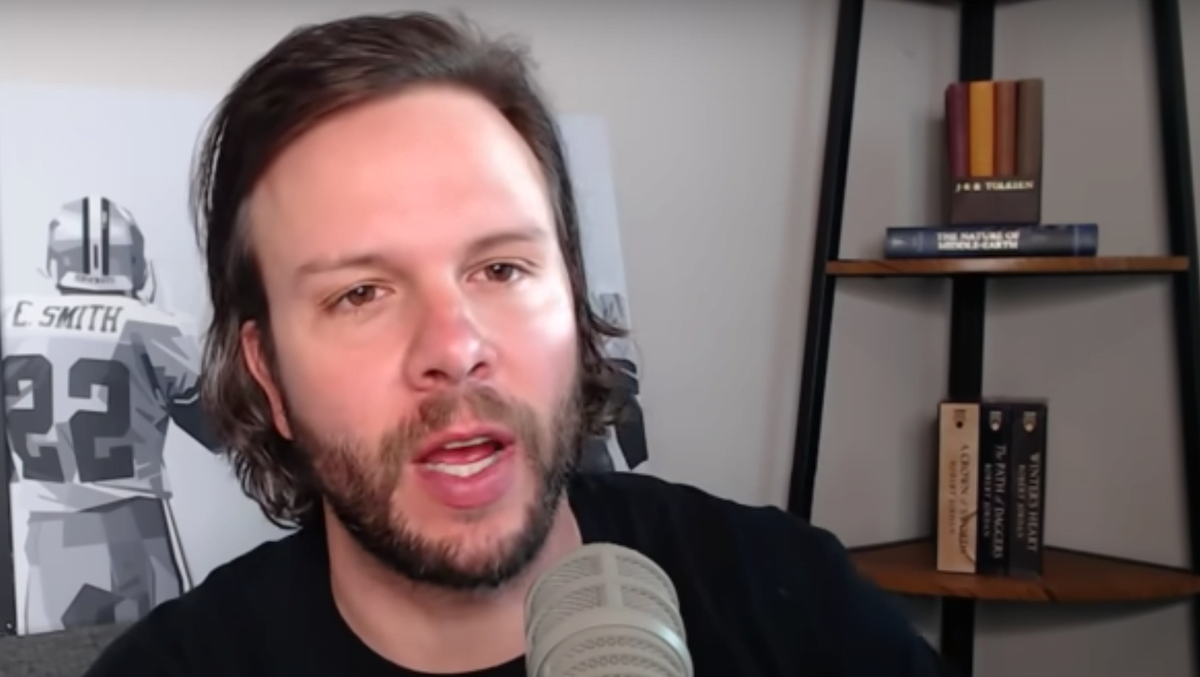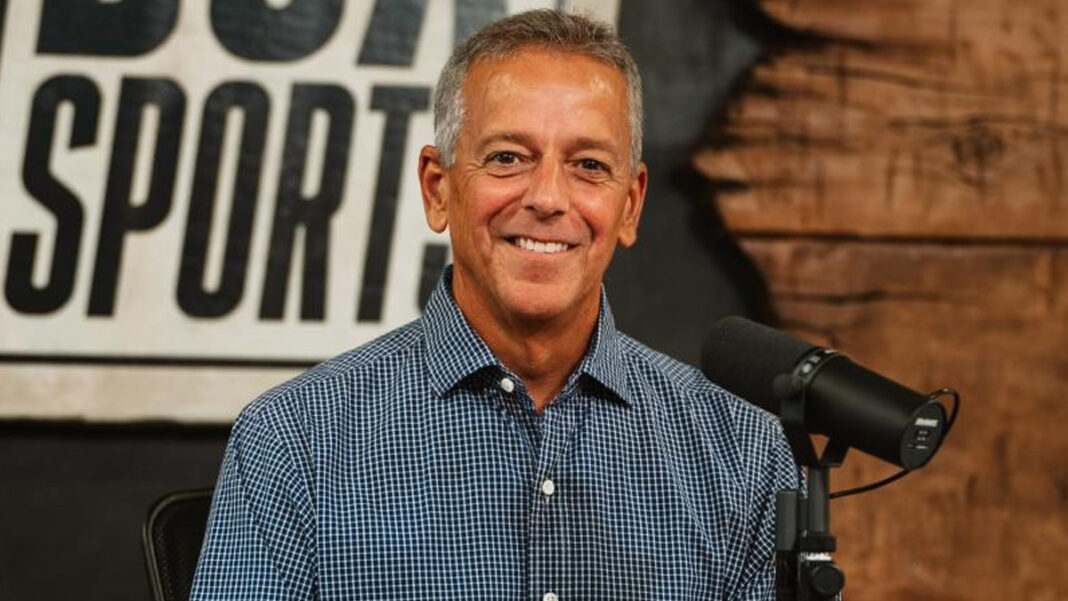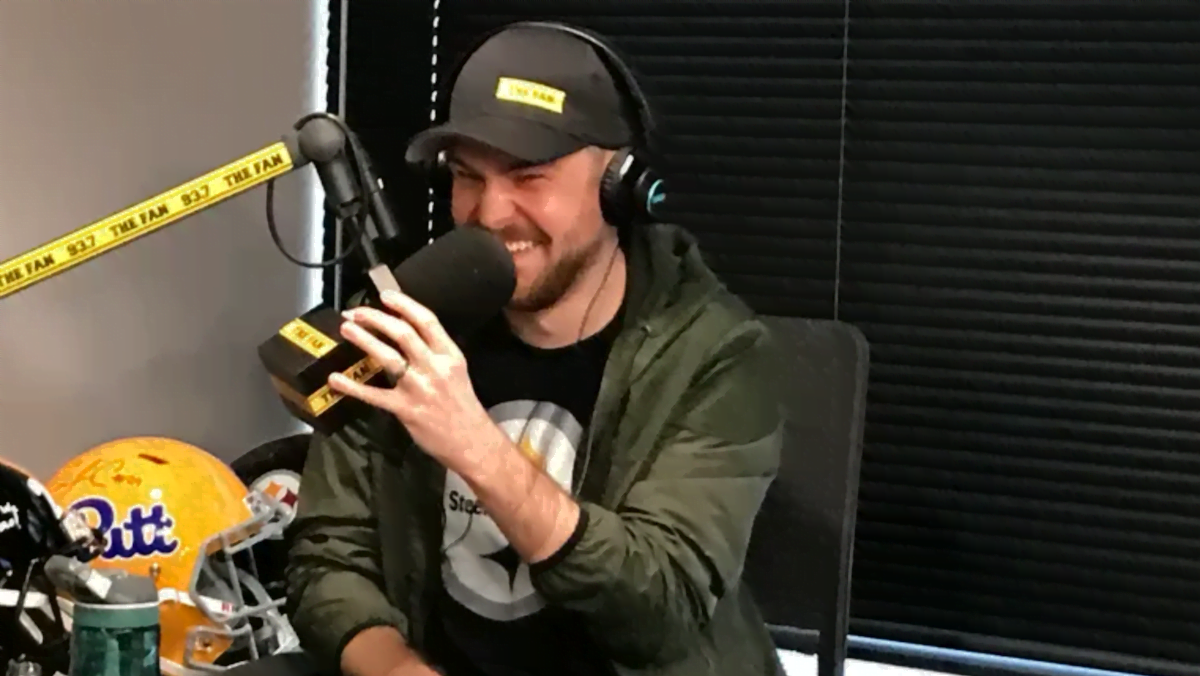Show prep looks a lot different for Jeff Cavanaugh than it did six months ago. Last year, while hosting at 105.3 The Fan in Dallas, he spent more time dreading preparing and filling his five-hour show than he spent enjoying it. It wasn’t a fun realization, but Cavanaugh knew feeling that way about his job was a huge problem. So instead of just pressing along and being unhappy, he did something about it.
On February 16th, Cavanaugh sent out a tweet that shocked many of his listeners. He announced he was leaving GBag Nation on The Fan in Dallas after 11 years. He explained his decision by admitting he didn’t have the same love for doing the show each day. It was a statement that revealed just how much he was struggling with the day-to-day grind of doing a five-hour radio show.
The official announcement came in mid-February, but the decision had been brewing for several months. Cavanaugh left without having another radio station or gig to fall back on.
“I would say it had been building for at least a year,” said Cavanaugh. “It’s a combination of things, the way that I left, I was friends with everybody. I don’t know how common it is to put in a two weeks notice and work the two weeks. I feel like normally in radio they just kick you off. But I knew it had just ground me down.
“Five hours a day and we were allowed to go off the sports page, but like anybody else, it needs to be mostly about sports. I just got to the point where I was trying to fill segments. Instead of doing something good, energizing, interesting, it just felt like work. And we’re lucky enough in our line of business that it doesn’t feel like work. For a long time, it didn’t. But it became a thing where I didn’t look forward to work and I knew I had built enough to do it another way if I wanted to.
“Like anybody I think there was an element of, when you get an offer from your company for your next contract, and you see what it’s going to look like, I did not think it reflected the value that I had and I let that be known. But I didn’t make that an issue on the way out, because money wasn’t going to fix it. Was there an element of disagreement on value? Yeah. I felt I was more valuable than they were showing me. That was probably the final little tipping point, where it was like, ‘ok, I’ll prove it. I’ll do it myself. I’ll build it.”
So Cavanaugh set out to bet on himself. He still writes about the Dallas Cowboys for The Athletic, Cowboys.com and D Magazine, but now he’s talking about sports on YouTube.
Looking back now it’s almost fate he decided to take his career in the direction he did. That’s because his introduction to talking about sports in the digital space happened by accident.
“It was accidental,” Cavanaugh said. “Like a lot of companies in radio, they came to the realization how important digital was and they wanted their on-air hosts to contribute with video. And it was like, ok, the file that I’m going to send is too big to email, so how am I going to do this? The answer for me was, I’ll upload it to a YouTube page and then send it. So they would post it on their own and get views for the website and all of a sudden I keep seeing subscriber numbers go up, and it said, ‘hey, do you want to turn on monetization? You’ve reached the level for that. It ended up being something that was good for them and for me.”
It’s easier said than done to leave a radio station, bet on yourself and become your own boss. Amongst many other things, you have to build an audience and know how to monetize your content. But if you can do those things, this may be the best time ever to try. Cavanaugh is a great example of that.
“I won’t close the door on radio if somebody agrees with what I think that job looks like for me,” Cavanaugh said. “I wouldn’t close the door on that, but I think the digital world, there’s so many ways to monetize it. You have to build a following first, but once you do, you can do that. You can do this without going into work. You can do this without a boss, between YouTube and Twitch and then you upload the audio to podcast formats and then you sell sponsorships. There’s a lot out there that can be done without working for somebody else.”
Cavanaugh’s new journey is only a few months old, but has he found the happiness he was looking for? He thinks he’s getting there.
Prep work isn’t dreaded anymore. In fact, prep work sometimes means asking his followers on Twitter what they care to hear about. He’ll comb through his responses and decide what would suit the audience best. It’s a brilliant way to go about selecting content.
“I don’t spend more than 20-30 minutes prepping anymore. It’s just the way my brain works too, because that’s the way I believe in doing it. I don’t script anything. I never have. Even with bits or a Jerry Jones impersonation. I don’t edit the stuff I do on YouTube either. I am very much a, what’s going on in your brain right now? Just say it. Just do it. It doesn’t have to be that I’m trying to prove something to you about this topic or that I have a strong opinion on this topic. It’s almost a podcast form. That’s more for me.”
There was a realization that struck Cavanaugh shortly after he left the station. Initially, he thought he’d be live on YouTube from 7-8 pm every night. Why? That’s when his old competitor, The Ticket in Dallas, was off the air. That way, he could more easily get guests from the station without competing with their local programming.
But then it hit him. His initial plan ran counter to why he left The Fan. He was leaving one structured format and creating his own.
“Within a week I said, no, that’s not what I quit for,” Cavanaugh said. “So no schedule, I record whenever I want and sometimes I do one thing a day, sometimes two or three a day, sometimes nothing. I have no structure to it and I like that.”
To be able to say what you want, when you want, however many times a day you want, is a dream scenario for any broadcaster. Also, it allows him to do a show with whoever he wants. Before, that wasn’t possible. Now, Cavanaugh dictates everything.
“Bob Sturm is a guy who, for my money, is one of the three best Cowboys resources on the planet,” Cavanaugh said. “I include myself in that category and I include my former co-worker Bryan Broaddus. But I want to be able to broadcast with them. I think that’s cool for the listeners. You can’t do that when you work in the same town for other stations. It’s not allowed. I want to do a show with my buddy Dane Brugler at The Athletic, because I think he’s the best NFL Draft resource on the planet. The Athletic and our former parent company Audacy don’t have an agreement and therefore we can’t have The Athletic people on. I want to be able to talk to who I want, when I want.”
I logged on to one of Cavanaugh’s YouTube shows earlier this week. Before he could even recount what Jerry Jones said earlier in the day, comments were pouring in on the live chat. I was incredibly impressed and took notice of how he interacted with all the comments. Instantly I thought, yeah, this is what he’s made for. And judging by the number of subscribers, I’m not the only one. As of last check, Cavanaugh has built a following to the tune of 29,700.
But what has Cavanaugh learned about developing a personal relationship with his viewers?
“It’s less about the sports content than it is about real life,” Cavanaugh said. “I forgot what the story was in sports, but it was something I decided to talk about on the air. It became emotional and it was where I almost involuntarily became a spokesman for all mental health topics, which is kind of weird but I’m totally down for it, because being an open book is way easier than playing a character. That’s where I learned the connection. People connected to me the last few years way more than the guy who started in radio eleven and a half years ago and hadn’t really figured himself out yet. It happened by accident and being a real person. Not by sports.”
So what’s Cavanaugh going to do today? Well, whatever he feels like. Same thing for tomorrow and the day after that. He left a world with complete structure and now has none. And that’s how he likes it.
But there’s no hard feelings towards The Fan. In fact, he says he’s close friends with a lot of the people in the building. But it is important to note that he was a talent doing five hours of radio a day and left because he lost the energy and passion. What can the industry do to make sure more instances of this don’t continue to happen?
“Ultimately, it’s nearly impossible,” Cavanaugh said. “Gavin (Spittle, the station’s program director) is a friend of mine and I left with no hard feelings toward him, the station or the team. It’s hard because it’s a company. It’s not like Gavin can unilaterally say, ‘You know what? You’re right. Here’s what you deserve and here’s what we’re going to do.’
“For instance, our parent company was in Philadelphia and they don’t know how I am. So I can say I’m worth this and my boss can agree with me, but if you want to really make something happen, you would be willing to have to go to war with someone that doesn’t even know who you are. It’s a hard part of the industry. Honestly, they might have viewed it as a positive when I left, because whoever replaces me, will do it for less.
“The goal is to win, not to save money. If I were a PD, my thing would be to hire creative, talented people and do the best you can to ensure they enjoy the structure they’re working in. And then get out of the way. That’s how you win.”
Tyler McComas is a columnist for BSM and a sports radio talk show host in Norman, OK where he hosts afternoon drive for SportsTalk 1400. You can find him on Twitter @Tyler_McComas or you can email him at TylerMcComas08@yahoo.com.







